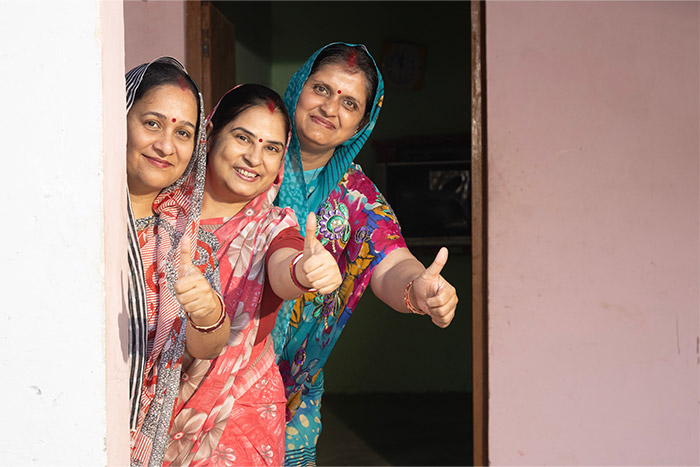SOFY, with its mission to empower women throughout life, has undertaken a ground-breaking initiative called Project Jagriti. This project tackles two critical issues faced by rural women in India: financial dependence and a lack of awareness around menstrual hygiene.
The Struggles of Rural Women
Approximately 57% of rural Indian women use cloth during menstruation, leading to health risks and making periods a difficult time. Furthermore, societal structures often keep these women financially dependent on men, restricting their personal choices. Alarmingly, 23 million girls drop out of school annually due to inadequate menstrual hygiene management.
SOFY’s Project Jagriti: Empowering Women, Transforming Lives
SOFY stepped in to bridge this gap and create a wave of change. Project Jagriti’s mission is to:
- Empower women entrepreneurs: By providing them with resources and training, Jagriti equips women to run their own businesses, like cosmetic shops, grocery stores, or beauty parlours.
- Increase menstrual hygiene awareness: Educational sessions are conducted within communities to dispel myths and encourage the use of sanitary napkins.
- Promote financial independence: A steady income allows women to contribute to household finances, fostering greater autonomy and decision-making power.
A Journey of Success
Launched nearly two years ago, Project Jagriti has already impacted nearly 200 women in villages across Sikar (Rajasthan) and Bulandshahr (Uttar Pradesh). These women have collectively earned a profit of close to 45 lakhs.
Measurable Impact
SOFY’s Project Jagriti’s achievements are truly remarkable:
- Increased Menstrual Hygiene Awareness and Napkin usage: Educational sessions have led to a staggering 85% increase in awareness and a 40% rise in napkin usage within the targeted villages.
- Financial empowerment: Women are now self-sufficient, contributing to their families’ well-being.
- Media recognition: Project Jagriti has garnered positive media coverage in both local Indian and Japanese publications.
Looking Ahead: A Brighter Future for Rural Women
SOFY’s commitment to empowering women continues. This year, Project Jagriti aims to include 100 more women entrepreneurs and expand its reach to additional rural areas. The ultimate vision? To achieve 100% napkin penetration in rural India by 2030.
FAQ’s
2. What types of businesses do participants start under Project Jagriti?
Women involved in Jagriti launch micro-businesses such as cosmetic shops, grocery stores, and beauty parlours. This enables them to generate income, gain financial independence, and meaningfully contribute to their household finances.
3. How many women have benefited from Project Jagriti so far?
Nearly 200 rural women across villages in Sikar (Rajasthan) and Bulandshahr (Uttar Pradesh) have participated in Project Jagriti, achieving measurable transformation in their lives.
4. What level of menstrual hygiene awareness improvement has been achieved?
Project Jagriti has led to an impressive 85% increase in menstrual hygiene awareness among the participating rural women, helping them understand safer, cleaner period practices.
5. How much has napkin usage increased in the program areas?
Napkin usage in target communities has risen by 40%, indicating successful adoption of improved menstrual care products due to educational efforts.
6. What kind of financial gains have women seen through Jagriti?
The women involved in Jagriti have collectively earned profits close to 45 lakh rupees, reflecting the economic impact and potential of their new entrepreneurial ventures.
7. Has Project Jagriti received any recognition or media coverage?
Yes, the initiative has garnered attention in both Indian and Japanese media outlets, acknowledging its positive influence on rural women’s empowerment.
8. What are the future goals of Project Jagriti?
Project Jagriti plans to onboard an additional 100 women entrepreneurs this year and expand into more rural areas, moving toward its vision of complete napkin penetration in rural India by 2030.
9. How many educational sessions has the program conducted?
Over 100 sessions have been held in rural communities to educate women and families about menstrual health, product use, and to break down taboos through open conversation.
10. How many sanitary napkin samples have been distributed?
Project Jagriti has distributed 20,000 sanitary napkin samples among rural women, making it easier for them to adopt hygienic menstrual practices and new products.

